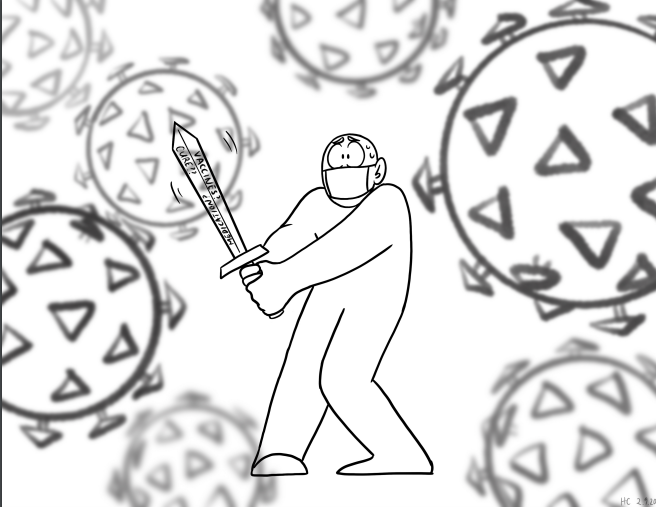Coronavirus Spreads Across the Globe, Panic Ensues
80,415 cases of the Coronavirus have been documented as of February 26th.
March 5, 2020
A recent wave of fear has swept over the globe as hundreds of deaths have been logged thus far from the recently-discovered and fast-paced global health concern: the Coronavirus.
Originating in Wuhan, China, the virus has now made its way around the globe with a death toll that has climbed to 1,300 people; over 80,000 individuals have been recorded to be infected with the virus to date.
A major obstacle between doctors and a solution is the limited medical communication and virus education globally. As CRLS AP Human Geography and Spanish language teacher, Alejandro Hernandez explained, “I don’t think the media has done enough. I would hope that on TV people are doing more comparative analysis [between the Coronavirus and the flu], but I don’t see a lot.”
Mr. Hernandez, who is one of the few CRLS teachers incorporating the virus into class curriculum, explained his move to do so, saying, “It tied in nicely with diffusion of cultural traits [the spread of an idea to more and more populations], of cultures, that we are doing right now … I like tackling what should be or what is on everyone’s mind at the moment. So I found it a perfect moment to introduce it in class with diffusion.” Mr. Hernandez added that the lack of structured conversation in the CRLS community about the Coronavirus, paired with the racism the Asian community has endured, led to his desire to bring issues connected to the epidemic to light.
Mr. Hernandez explained his goals behind constructing a lesson about the virus: “One is awareness. So far, no communication has been broadcasted. Two, it’s a message of hope, of standing in solidarity with those that are affected and going through a crisis, depression, hopelessness when you feel like your city is locked down and you have an epidemic in your area.” Mr. Hernandez is placing emphasis on the effects of the outbreak in Wuhan in his lesson and explained that he hopes to stand with those who are affected the most by this epidemic.
The Coronavirus has strikingly similar symptoms to those of the common flu—fever, coughing, difficulty breathing—however, its effects are far more detrimental and its dissemination far more fast-paced.
While the Coronavirus is an enormous risk to those in Wuhan, China, and surrounding areas, in the United States, the flu poses exponentially more risk, as thousands of people have already died from it this year.
Biology teacher Janira Arocho cited, “what people don’t know is that NPR had a little thing last week about the flu: 8000 people have died already this season of this strain, and so it’s weird—nobody gets really worried about that even though the numbers are really really high. … Of course the percentage of people who die of the flu [is lower] as compared to the percentage who die of Corona … So that’s also why people are so scared, right?”
Still, Ms. Arocho emphasized the need for more education and protection around the flu, as it is a more immediate threat to us here in Cambridge.
Average flu precautions like hand washing, avoiding those that are sick, not sharing food, and isolating a cough or sneeze away from others, have proven to be the most effective tactics at this point in time. Those most vulnerable to the virus are those with weak or compromised immune systems, the most endangered being elderly people. That being said, this heightened vulnerability does not mean those groups of people will definitely contract the Coronavirus or that others will definitely not. Coronavirus is a virus, meaning antibiotics do nothing to stop its growth. No vaccinations or home remedies work to stifle one’s risk of contracting the virus. There are no medications currently associated with treating the Coronavirus, but this does not mean one shouldn’t seek medical attention when needed. If you think you might have the flu or are feeling ill, it is always wise to consult a medical professional for close-monitoring and increased care.
As the Coronavirus is an extremely recent outbreak, there is more and more coming out about it daily and so much left to be discovered. This can be scary, but should also be a source of hope. Ms. Arocho told the Register Forum, “it is scary because there is so much unknown where people don’t know enough about the virus and we don’t have vaccines for it yet—or they might be in the works or whatever—but I think it is the unknown.”
This piece also appears in our February 2020 print edition.











